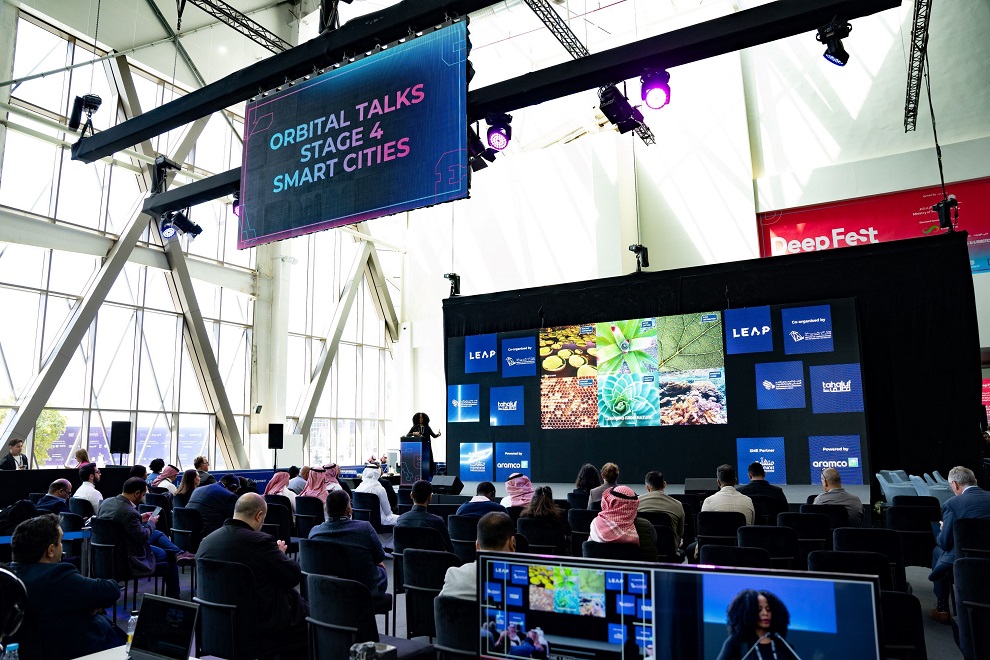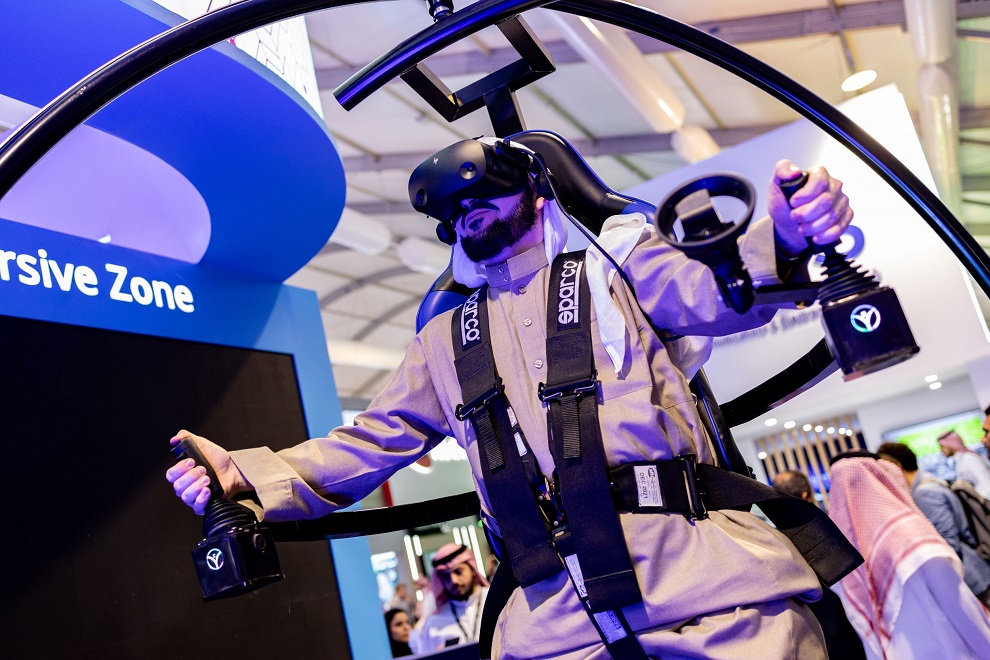After announcing a staggering USD 11.9 billion of investments on Monday, March 4, LEAP 2024, the world’s most attended technology exhibition, unveiled another raft of investments totaling over USD 888 million on March 5.
The investments at LEAP 2024, which runs until March 7 at the Riyadh Exhibition and Convention Centre in Malham, will support local start-up ecosystems covering industries such as digital payments, e-gaming, and artificial intelligence.
Investcorp launched a US$500 million growth stage fund, while Oasis Capital launched Fund II with a capital of US$100 million; the National Development Fund and the Social Development Bank established the US$40 million Gaming and Esports Investment Fund, to be managed by Impact46; and Merak Capital established an US$80 million fund to support gaming accelerators in Saudi Arabia.
Elsewhere, Saudi Arabia’s Takamol Holdings launched a US$50 million investment arm focused on funding early-stage tech companies; Plug and Play announced its first fund to invest in technology startups; and X by Unifonic revealed its first investment fund to support business software services for startups.
“With on-show investments now approaching US$13 billion, today’s announcements and LEAP’s robust content schedule underscore the event’s unlimited potential to convene, leverage, accelerate, and inspire Saudi Arabia’s unique and dynamic technology sector,” said Michael Champion, CEO of Tahaluf – the strategic joint venture between Informa PLC, the Events Investment Fund (EIF), and the Saudi Federation for Cybersecurity, Programming and Drones (SAFCSP), which organises LEAP alongside Saudi Arabia’s Ministry of Communications and Information Technology (MCIT). “As we look to fuel commercial growth and technology-enabled social progress across the globe, LEAP and Saudi Arabia are proving crucial enablers in championing industry-wide collaborations and public-private partnerships.”
Zoom Amplifies Product and Service Expansion in Saudi
Communications tech giant Zoom expanded its commitment to Saudi Arabia with various announcements at LEAP 2024, including Zoom AI Companion being available for its Kingdom-based customers by the end of July 2024, Zoom Phone being available by October 2024, and Zoom Contact Centre being available by the end of the year. Zoom will also add two more cloud regions in the country this year, the first of which will be available this month.

Addressing the news on LEAP 2024’s Main Stage, Founder and CEO Eric Yuan also predicted that Zoom users will no longer have to attend their own meetings in the future, with a ‘Digital Twin’ taking on some day-to-day tasks: “Step one for Zoom is the integration of AI into our product, which is already happening. If you are late to a meeting, you can ask for an AI-generated synopsis of what you may have missed to get up to speed,” said Yuan.
“What’s next? In the future, a Digital Twin can join the meeting on your behalf, conduct the meeting, download everything you need to know, including highlights, and send it to your device. We can take it even further, whereby even if we are halfway around the world, we can shake hands and feel that interaction. If I make a coffee, you can smell the aroma in the room. Innovation is only going to get better, and things which now seem like a dream will become reality,” Yuan added.
UK and Saudi Agree Landmark Research Deal
Amid a slew of major investments announced at LEAP 2024, the UK and Saudi Arabia have agreed a landmark deal to boost research links and collaborate on deep science and tech breakthroughs. The agreement, signed by Andrew Griffith MP, Minister of State for Science, Research and Innovation, and His Excellency (HE) Abdullah Alswaha, Saudi’s Minister of Communications and Information Technology (MCIT), will see the two countries collaborate in tackling some of the world’s most pressing challenges, from food security to clean energy.
“The Kingdom of Saudi Arabia is on an ambitious journey to modernise its economy and harnessing the power of science and technology is central to that transformation. Collaboration on a global scale is an essential part of realising the UK’s ambitions in science and innovation, and the sheer scale of Saudi Arabia’s aspirations means this relationship will be a key part of our own hopes for science and tech in years to come,” said Griffith.
META: Blockbuster Times Ahead for AI and Content Creators
Speaking at LEAP’s Creative Economy and Gaming Orbital Stage, a new addition to LEAP, Moon Baz, Head of Global Partnerships for Middle East, Africa and Turkey at META, discussed how AI integration is disrupting content creation.
“We are seeing a fundamental shift in power from institutions to individual creators, like [Lionel] Messi and Logan Paul, who are driving the rise of creator-first brands and showing how creators can take control over their IP’s. If we add the integration of AI into storytelling, and how creators are experimenting with AI, Augmented Reality (AR), Virtual Reality (VR), and visual arts to create immersive content, productivity is increasing and they are supercharging their storytelling,” said Baz.
“Now, let’s talk about the elephant in the room – AI influencers. They are niche but they are gaining traction and followers. However, I believe we are still a way off them replacing real-life creators. For this to gain followership, we need to become more comfortable with being in the metaverse, more comfortable with being in immersive worlds, and more comfortable with seeing our avatars getting closer to these types of creators.”
Baz added Generative AI is already transforming the content industry, citing data stating 40 per cent of enterprise apps will have embedded conversational AI by the end of 2024. Fast forward to 2027, and nearly 15 per cent of new apps will be generated by AI and, by 2030, a major blockbuster movie will be released with 90 per cent of the film generated by AI.
Space, The Moon, and Beyond – Saudi Reaches for the Stars
On LEAP 2024’s Orbital Talks Stage focused on Space, a capacity audience received an inspiring update on the Saudi Space Agency’s (SSA) plans to become one of the world’s leading nations in space exploration – and how the country’s space strategy will catalyse spin-off technologies for humanity on Earth.
Delivered by Sharif Abdel-Magid, Vice President – Space Operations at SSA, and astronaut Rayyanah Barnawi – the first Saudi women to complete a mission aboard the International Space Station – the pair outlined the Kingdom’s vision to propel the country’s space industry forward.
“The purpose of any Space Agency is it to turn fiction into non-fiction,” said Abdel-Magid. “We endeavour to take things that haven’t been done before and create them. The technology may not exist yet, so we create it. Saudi Arabia has signed the Artemis Accords to be part of humanity’s next leap of going back to the Moon. From there we are going to establish a permanent presence on the Moon with the ultimate vision of going to Mars. We’ll use the Moon as a test bench to establish, test, then re-test, again and again, the technology to go to Mars. It’s the first step in a long journey of commitment.
Asked when a Saudi citizen will step foot on the Moon, Abdel-Magid added: “We are working hard every day to make progress and get to that goal. I won’t commit to a date today, but this is the primary objective of the SSA.”
Barnawi, a natural contender for a future Moon mission, added: “Spin-off technologies from space development benefit wider society, as we’ve seen from mobile phone cameras to fire fighter equipment. There are three key factors in how space technology can fuel wider adoption: reducing cost and energy, increasing yield and quality, and developing current technologies. We’re going to build an ecosystem at the Saudi Space Agency that allows us to do things at a more cost-effective level than ever before.”
Cognitive Robots: The Human Wildcard in Digital Darwinism
With a futuristic assortment of robots engaging visitors at LEAP 2024, David Reger, the CEO of Neura Robotics, outlined his vision for cognitive robots that can become collaborative partners for humans in modern society during his session on the event’s Orbital Talks – 4IR Stage.
Having developed the world’s first robots with cognitive capabilities using AI and proprietary sensor and hardware design, Neura’s fleet of cognitive robots can already work alongside humans with unprecedented safety, speed, and precision.
The ongoing challenge, according to Reger, is ensuring robots and the advance of AI enable humans to do more of what they want to do and less of the tasks they do not need to: “We believe we can make AI even more useful for us,” he said. “Humans are still doing tasks that robots could and should do. The next phase is giving robots bodies so they can serve us better and embodying AI so they can do things we don’t like to do—even simple things like taking out the garbage. We need robots to do tasks that give humans more time to do the things we want – and need – to do. This is the transformation that’s coming, moving from industrial usage to usage that helps humanity.
“Robotics will transform from a niche market to a mass market, and adding cognitive abilities will enable robots to see, hear, touch, feel, and react safely in the human environment,” added Reger, who also represents the European Senate of Economy and Technology, an international organisation working predominantly in the fields of business, politics, science, and technology.

Saudi Arabia: a “perfect” destination for floating cities of the future
On the Orbital Talks Stage focused on Future Energy & Smart Cities, Itai Madamombe, Founder and CEO of Oceanix, explained why Saudi Arabia’s natural geographies and calm coastal waters make the country a prime candidate for floating cities of the future.
With Oceanix already building the world’s first sustainable floating city protype in the South Korean city of Busan, Madamombe outlined why the company’s proprietary, module-based floating platforms – which feature fully integrated closed loop systems catering for everything from waste management to energy generation – can expand Saudi’s residential, commercial, and environmental footprint.
“Humanity living on water is inevitable and imminent, and Saudi Arabia has perfect waters for floating infrastructure,” said Madamombe. “The Oxagon project at NEOM has a floating component, and our architect designed that project, so Saudi Arabia is already awake to floating infrastructure; the government has already shown interest in this type of development.”
With coastal cities at the forefront of climate change and flooding in coastal areas destroying billions of dollars’ worth of infrastructure every year, Madamombe explained why floating habitations represent a more sustainable approach to extending land and living areas. “Around three million people are moving to cities every week, and current solutions – which predominantly include reclaiming land – are very expensive and destroy ocean habitats. Oceanix is redefining how humanity can exist through reconfigurable, sustainable communities that exist in harmony with nature and also help to regenerate marine ecosystems.”








